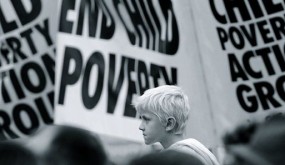
Arbitrary lines, short-term approaches and small statistical gains
“We might deduce from the above that, if these families lives have been ’turned round’ then tackling the poverty which is likely to affect many of them is simply not even a goal anymore.” Stephen Crossley considers whether the Coalition’s Troubled Families agenda will reduce child poverty.

A responsible approach?
“…when it suits them, this government (perhaps all politicians) are more than happy to characterise something that was making (slower than expected) progress as an ‘exhausted’ approach that failed and actually made things worse.” Stephen Crossley challenges the Coalition’s portrayal of their child poverty strategy.

The (invisible) problem of riches
Last week on this blog, Jonathan Bradshaw argued that our ‘benefits system’ wasn’t broken and highlighted how the tax system in the UK did not do anything to help tackle poverty as it failed to redistribute wealth effectively. Whilst the tax system may not directly redistribute wealth, if everyone (including organisations) paid the tax that they were […]
Ways of extending the welfare state to the poor
“Part of the problem, in my view, is the ‘sloganization of social policy’ outside of academia, which leads to politicians framing the discussion as being a problem between ‘shirkers and workers’, ‘strivers and skivers’ and ‘hard-working families’ vs ‘troubled families’.” Stephen Crossley proposes some alternative, more thoughtful slogans for social policy.

“Brainwashing under freedom”
Yesterday, Nick Pearce from IPPR suggested in a Guardian blog that Labour should ‘drop its child poverty target’ and new measures should ‘take into account the fiscal realities we now face.‘ One of his proposals included ‘freezing child benefit in cash terms for a decade’ to ‘free up £2.5bn a year to invest in quality […]
Dadlessness or factlessness?
“…it shouldn’t surprise us if some families do split up under the weight of poverty, but what is more surprising is the very high number who stick together through these times.” Stephen Crossley challenges the dominant story about ‘family breakdown’ as the cause of poverty - and suggests some think tanks should take a closer look at the facts.

What is the ‘economic reality’?
“There is almost blanket acceptance of the ‘need’ for austerity and the tough ‘operating environment’ that this creates, not least in social policy areas such as poverty and low-pay, where policy solutions have to ‘fiscally credible’. However, the figures …suggest that the economic reality might not be all it seems.” Stephen Crossley challenges the widespread consensus for cuts.

Women and children last?
“The criticisms of the Thatcher administration …are, in my opinion, very similar to the criticisms that are being voiced today about a wide range of issues and groups affected by welfare reform and ‘austerity measures’.” Stephen Crossley at the North East Child Poverty Commission draws some parallels between governments then and now.

The impoverishment of the UK
The Poverty and Social Exclusion Team have just published their first report ‘The Impoverishment of the UK’ which documents the deprivation suffered by a growing number of people living below what the public agrees is a minimum standard of living. It is the result of the largest ever study of poverty conducted in the UK, funded by the Economic and […]